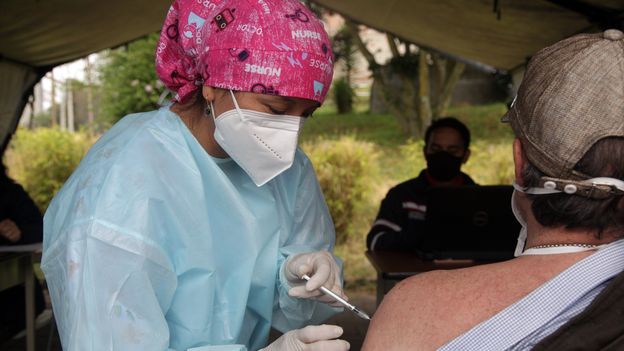
Buoyed by their success in developing one of the first Covid-19 vaccines, Moderna has recently entered the fray, announcing their intention to produce a vaccine which could protect against all four coronaviruses that cause the common cold.
All scientists agree that a truly universal vaccine, which could protect against every single coronavirus that might emerge in future, would be a genuinely game-changing moment for human health, especially in the wake of the devastation caused by the Sars, Mers and Sars-CoV-2 (the virus that causes Covid-19) outbreaks of the last 20 years."A universal coronavirus vaccine would be a tremendous advance," says Wayne Koff, president and CEO of the Human Vaccines Project.But while this would be the pinnacle of pan-coronavirus vaccine research, it remains to be seen whether it can actually be achieved.As a result, the first step towards a possible universal coronavirus vaccine is likely to be a so-called "variant-proof" vaccine, which aims to protect against all current and future strains of Sars-CoV-2 and help end the worst impacts of the pandemic."A variant-proof vaccine could slow the transmission of Covid-19 and stopping such transmission is the only way we can move past the pandemic," says Patrick Soon-Shiong, CEO of ImmunityBio, one of six US government-funded research groups or companies taking on the challenge.A pan-coronavirus vaccine would protect against viruses like Sars, as well as Covid-19 (Credit: Getty Images).Earlier this year Gritstone bio reported that their own variant-proof candidate could train the immune system to recognise a broad range of viral proteins, while in June 2021 ImmunityBio revealed that their vaccine elicited immune responses against both the Alpha, Beta and Gamma variants of Sars-CoV-2.The most exciting findings so far have come from the Walter Reed Army Institute of Research, who found that their vaccine showed immunising capabilities against a range of Covid-19 variants as well as the original Sars virus when tested in non-human primates.Rather than entering the competitive landscape of Covid-19 vaccines, other researchers have decided to look at different forms of pan-coronavirus vaccines.For Andrea Carfi, Moderna's chief scientific officer for infectious diseases, it seemed a natural next step to develop a vaccine that could help protect the elderly and immunocompromised from these viruses by identifying commonalities in their protein sequences.While a pan-betacoronavirus jab would still not come close to being a universal coronavirus vaccine – it would still leave the other three groups of coronaviruses, alpha, delta and gamma, untargeted – it is still an incredibly challenging goal.A vaccine that works on all coronaviruses would not only help to prevent new pandemics, it would provide some protection against the common cold (Credit: Getty Images).Last autumn, the esteemed virologist Linfa Wang, an infectious diseases professor at Duke-National University of Singapore Medical School, Singapore, found that Sars survivors who had received the Pfizer-BioNTech Covid-19 vaccine had antibodies in their blood capable of protecting them against Sars, the Alpha, Beta and Delta variants of Sars-CoV-2, and five other coronaviruses which reside in bats and pangolins
Jeffrey Taubenberger, a senior investigator in viral pathogenesis and evolution at the National Institutes of Health, feels that while a full universal coronavirus vaccine may be out of reach, these studies indicate that a sarbecoronavirus or betacoronavirus jab may indeed be feasibleThe big question for all pan-coronavirus vaccine developers is whether they can succeed where pan-influenza vaccines have failedThe NIH's National Institute of Allergy and Infectious Diseases unit has an annual budget of approximately $220m (£180m/€212m) for universal flu vaccine research but progress has been minimal despite decades of striving
VBI Vaccines, who are developing a pan-sarbecoronavirus vaccine that would target the close relatives of Covid-19
So far VBI's vaccine has elicited strong neutralising responses against the Delta, Beta, Omicron and Lambda variants of Sars-CoV-2 as well as RaTG13, a coronavirus which is closely related to Sars-CoV-2 but is currently found only in batsScientists are hopeful that the first variant-proof Covid-19 vaccines will be available by 2024, potentially ushering in a wave of coronavirus jabs offering increasingly broad protection